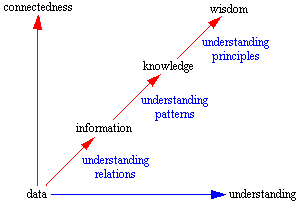
Went to a party this weekend at UNIT, a Tokyo club that has regular drum n' bass events. As dnb has been my genre of choice for the past four years or so, and it had been a while since I had been to a DJ event, I checked out their latest party last weekend.
The headliner was DJ Terry T with MC Demolition man. Check out Terry T's myspace: http://www.myspace.com/djterryt. His record label is called "Knowledge and Wisdom." Though I'm undecided about the capacity jungle drum n' bass to promote knowledge and wisdom (as opposed to just being fun for some and noisy for others), the exposure to his music and the concept of his record label provided me with an opportunity to reflect on knowledge and wisdom, twin concepts that I think are essential for media literacy and awareness. For years, I have been thinking of these concepts as knowledge and understanding, but I'll take the cue from Terry T and go with knowledge and wisdom in this post.
Knowledge refers to the gathering of information. It is what we learn when we study for a test, memorize a list of vocabulary words, gain technical skill necessary for music production, or consume statistics about deomographics or poll results. Knowledge refers to the content of information. It is "what" we learn.
Wisdom, or what I call understanding, is a much deeper process. It refers to the graceful, intelligent, and intuitive application of knowledge in one's life. For example, one might have knowledge of the negative effects of consuming too much sugar and fat. Even with the knowledge that excessive sugar and fats don't contribute to a healthy diet, and even with a desire to live healthily, one may continue to eat too much sugar and fat. Yet one who has developed wisdom with regards to health and nutrition will refrain from eating these unhealthy foods excessively, though perhaps consume them in moderation.
Here is a more nuanced article about knowledge and wisdom, summarizing the work of Russell Ackoff. I found it at the top of a google search of the terms "knowledge and wisdom." http://www.systems-thinking.org/dikw/dikw.htm

As a student of religion in college, it became necessary for me to make a distinction between knowledge and wisdom. In my studies, I found myself coming back to the same question time and time again: what is the relationship between scholarship and practice? Scholarship of religion in secular academic institutions is divorced from the practice of particular wisdom traditions, and for good reasons. Though I'm glad to have gained some general knowledge about various religious traditions and religious studies itself, both analytical and content knowledge, I realized that what I was seeking was wisdom. And that this pursuit was, to a large degree, something seperate from the learning I was doing in my classes.
The pursuit of wisdom has been largely relegated to religious and philosophical institutions for much of human history. One of the things that concerns me about the media and technology boom of the past century is the displacement of these traditions. In many cultures, it is becoming more and more difficult to derive meaning from traditional religious symbols. Our current media/technology-scape provides us with a deluge of knowledge. Many of our wisdom institutions are having trouble adapting to this new cultural landscape, though they are indeed trying. What remains to be seen, and what I'm interested in exploring in this blog, is how new wisdom traditions will be created to respond to the need for organization of the massive amounts of knowledge flowing through our lives.
Posts to follow:
-My Childhood: Religion and TV
-The Center for Religion and Media @ NYU
http://crm.as.nyu.edu/page/home
No comments:
Post a Comment